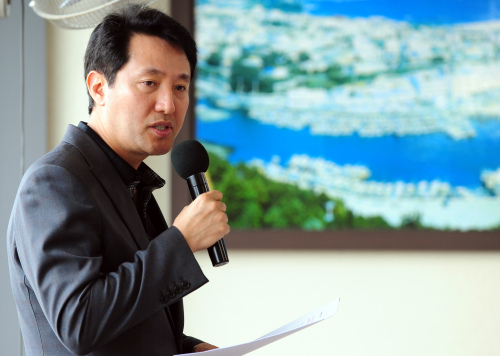After six-month standoff, mayor vows to oppose DP through direct negotiations
JEJU ISLAND ― Seoul Mayor Oh Se-hoon said Saturday he would attend the opposition-dominated city council this week, after refusing to attend for more than six months.
“I think now is a time to seek reconciliation and dialogue under a new political atmosphere. I will attend the plenary meeting of the city council to persuade and sometimes fight with them,” Oh told reporters on Jeju Island on Saturday.
 |
Seoul Mayor Oh Se-hoon speaks during a press conference onboard a passenger ship to Jeju Island on Friday. (Yonhap News) |
In the local elections in April last year, the mayor from the Grand National Party was re-elected, but the city council became dominated by the opposition Democratic Party, and the two sides have been at loggerheads since.
In December the city council cut the annual budget for the city’s major policies and approved the 70-billion-won school meal ordinance despite the mayor’s fierce resistance.
Since then, the mayor has declined to appear at the monthly meeting, saying more welfare benefits should be given to underprivileged people.
“I have already offered my conditions to the city council to resume the talks, but regardless of their answer I’ll talk with them,” he said, declining to specify what he had proposed.
His decision came one day after he declared the city’s first plebiscite vote on the school meal ordinance in August, which was demanded by an association of 160 conservative civic groups that have collected more than 800,000 signatures from citizens.
For the mayor, who is considered one of the GNP’s key candidates for next year’s presidential election, the voting result will be a very important indicator on his political future.
“The vote will be a turning point whether the nation’s welfare policy will go to excessive welfare or to selective welfare. There are some criticisms about the vote itself but I think they are politically intended without considering the nation’s future,” Oh said.
“In order to protect the future, I think we need the courage to risk political loss for now. The final decision will be made by people,” he said.
Oh, together with city officials and reporters, arrived Saturday on Jeju after a 13-hour voyage from the port city of Incheon, some 40 kilometers west of Seoul.
The city is working on creating a port terminal in Yeouido, Seoul, so that international cruise ships can come in and out of the city directly through the West Sea ― another project facing the council’s opposition.
While the construction work for a waterway between Incheon and Gimpo is scheduled to be completed in October, the 15-kilometer section between Gimpo and Yeouido has been stalled due to the budget cut by the city council, which has criticized it, saying it is part of President Lee Myung-bak’s abandoned cross-country canal project.
“The project will attract Chinese and Japanese travelers who have great purchasing power. The new seaway will also boost the local economy in other port cities such as Gunsan, Mokpo, Jeju, Jinhae and Busan. I will never give up,” Oh said.
He reaffirmed his strong will to push ahead with the project, saying the city would dispatch smaller ships and buses to transport foreign visitors to Seoul and seek state funding to complete the construction in consultation with the president.
By Lee Ji-yoon (
jylee@heraldcorp.com)








